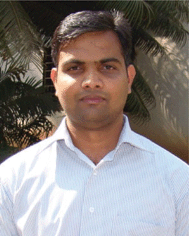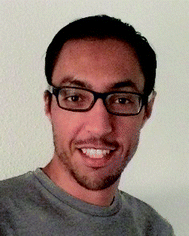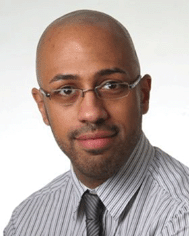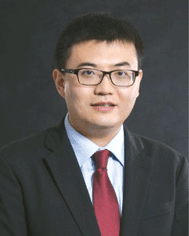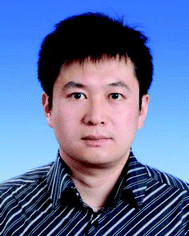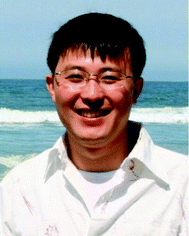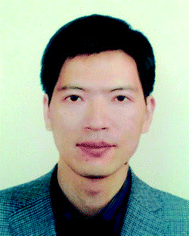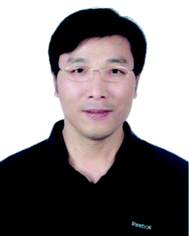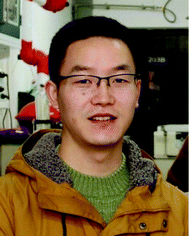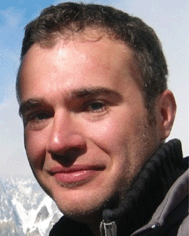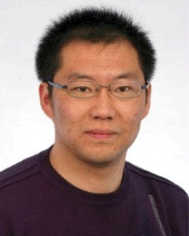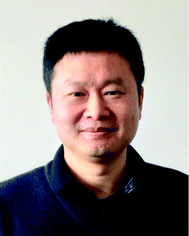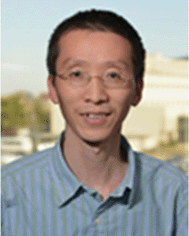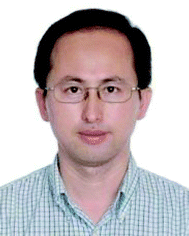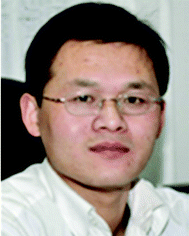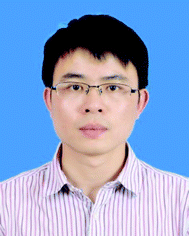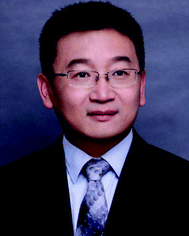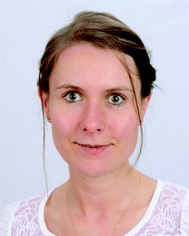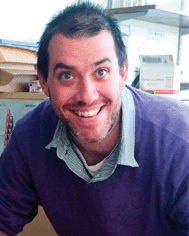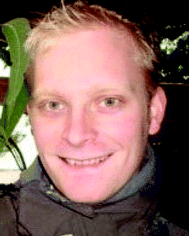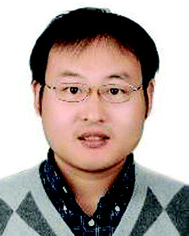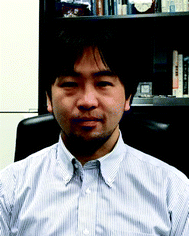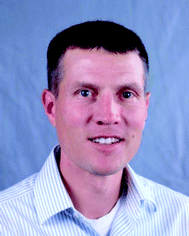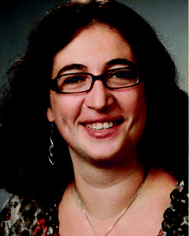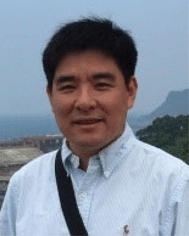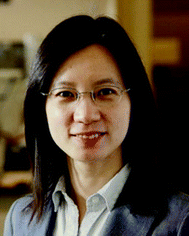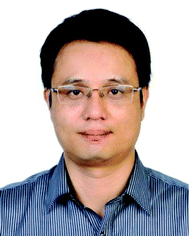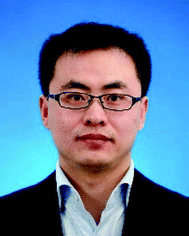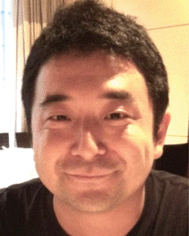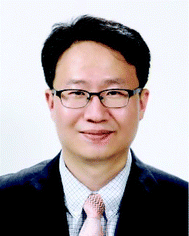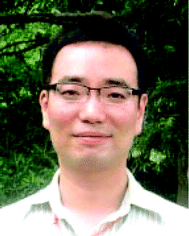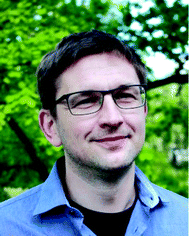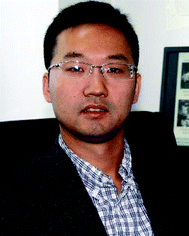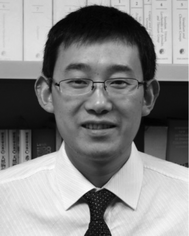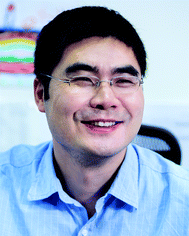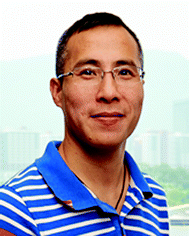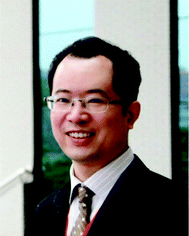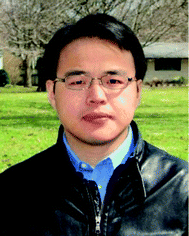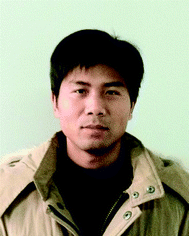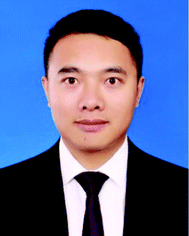Contributors to the 1st Emerging Investigators collection
Abstract
Welcome to the inaugural “Emerging Investigators” themed collection from Organic Chemistry Frontiers! The purpose of this collection is to recognize outstanding organic chemists in the early stages of their independent careers. We thank all of the 40 contributors from throughout the world. Here we introduce to you these up-and-coming scientists and their exciting research in today's organic chemistry.
A. T. Biju was born and raised in Cochin, Kerala, India. He received his B.Sc. and M.Sc. from Mahatma Gandhi University, Kerala, India, and his Ph.D. under the guidance of Dr Vijay Nair at the CSIR-NIIST, Trivandrum, India. Subsequently, he was a post-doctoral fellow with Prof. Tien-Yau Luh at the National Taiwan University, Taipei and an Alexander von Humboldt fellow with Prof. Frank Glorius at the Westfälische Wilhelms-Universität Münster, Germany. In June 2011, he began his independent research career at the CSIR-National Chemical Laboratory, Pune, India. His research is focused on the development of transition-metal-free carbon–carbon and carbon–heteroatom bond-forming reactions using aryne chemistry and N-heterocyclic carbene (NHC) organocatalysis, and their application in organic synthesis. He is the recipient of a CRSI Young Scientist Award (2015), NCL-Research Foundation Scientist of the Year Award (2014), ISCB Young Scientist Award (2014), Thieme Chemistry Journals Award (2014), OPPI Young Scientist Award (2012) and Alexander von Humboldt Fellowship (2009), and is a member of the National Academy of Sciences, India (NASI), Allahabad (2012).
Link to his article:
http://xlink.rsc.org/?doi=C5qo00328h
Abderrahmane Amgoune received his PhD in 2006 from the University of Rennes (Profs. J.-F. Carpentier and C. Thomas), France. He then moved to the University of Konstanz as an Alexander-von-Humboldt postdoctoral research associate to work with Prof. S. Mecking. In 2008, he was appointed to a CNRS research position at the University of Toulouse. His current research is dedicated to coinage metal chemistry, gold chemistry in particular (coordination chemistry and reactivity), and involves the rational design of gold complexes for the development of new catalytic reactions for applications in organic synthesis and polymer materials.
Link to his article:
http://xlink.rsc.org/?doi=C6qo00128a
Alexander Breder is a research group leader at the Georg-August-University of Göttingen, Germany. He received his diploma degree from the University of Bielefeld, Germany, and pursued his doctoral studies at the Swiss Federal Institute of Technology Zurich (ETH), Switzerland. Subsequently, he began his postdoctorate studies at Stanford University, United States, and started his independent career in late 2011. Since then his research activities have focused on the investigation of novel concepts in metal-free catalysis and reaction design within the broader context of method development and synthesis of biologically relevant molecules.
Link to his article:
http://xlink.rsc.org/?doi=C5qo00361j
Ang Li was born in Jilin, China, in 1982. In 2004, he received his B.Sc. from Peking University, where he worked with Prof. Zhen Yang. He earned his PhD under the supervision of Prof. K. C. Nicolaou at The Scripps Research Institute in 2009. After a brief stay as a research fellow at the Institute of Chemical and Engineering Sciences in Singapore, he joined the Shanghai Institute of Organic Chemistry, Chinese Academy of Sciences, as a professor in 2010. His current research is focused on the total synthesis of structurally and biologically interesting natural products.
Link to his article:
http://xlink.rsc.org/?doi=C5qo00416k
Bing Han obtained his BSc degree from Northwest Normal University in 2000, and then he moved to Lanzhou University and received his PhD degree in 2006 under the supervision of Prof. Zhong-Li Liu. After postdoctoral work with Prof. Jay K. Kochi at the University of Houston, USA, he started his independent research at Lanzhou University in 2008. Bing Han was selected for “The MOE New Century Excellent Talents” (2013) and was a winner of “The National Science Fund for Excellent Young Scholars” (2014). His current research interests are radical chemistry and physical organic chemistry.
Link to his article:
http://xlink.rsc.org/?doi=C5qo00352k
Bing-Feng Shi received his B.S. degree from Nankai University in 2001 and a Ph.D. degree from the Shanghai Institute of Organic Chemistry, Chinese Academy of Sciences, under the guidance of Professor Biao Yu in 2006. Following time as a postdoctoral fellow at the University of California, San Diego (2006–2007), he moved to The Scripps Research Institute to work with Professor Jin-Quan Yu as a research associate. In 2010, he joined the Department of Chemistry at Zhejiang University as a professor. His research focus is transition-metal-catalyzed C(sp
3)–H functionalization and its application in the synthesis of biologically important small molecules.
Link to his article:
http://xlink.rsc.org/?doi=C5qo00319a
Bo Liu obtained his Ph.D. degree in 2004 from the Shanghai Institute of Organic Chemistry, Chinese Academy of Sciences, under the supervision of Professor Weishan Zhou. He carried out postdoctoral research for more than two years in the group of Professor Jef K. De Brabander, UT Southwestern Medical Center, Dallas. In 2007, he returned to China and began his independent career in Sichuan University. He is now a Professor in Chemistry at the same university. His research interests include natural product synthesis and synthesis-oriented methodology development.
Link to his article:
http://xlink.rsc.org/?doi=C5qo00373c
Congyang Wang was born in Jiangsu Province, China, in 1977. He obtained his BS degree from Nanjing University in 2000 and his Ph.D. degree from Peking University under the guidance of Professor Zhenfeng Xi in 2005. After a postdoctoral stay of two more years in the same group, he moved to the University of Münster, Germany to work with Professor Frank Glorius as an Alexander von Humboldt Research Fellow. In 2010, he started his independent research at the Institute of Chemistry, Chinese Academy of Sciences (ICCAS) as a professor. His research interests include organometallic chemistry, transition metal catalysis, and the synthesis of functional molecules. Currently, his group is focusing on manganese-group-metal catalysis.
Link to his article:
http://xlink.rsc.org/?doi=C5qo00336a
Da-Gang Yu was born in Jiangxi Province, China, in 1986. He obtained his Ph.D, working with Prof. Dr Zhang-Jie Shi at Peking University, in 2012. Then he carried out postdoctoral research, with a Humboldt fellowship in the group of Prof. Dr Frank Glorius, Muenster University. Since 2015, he has been working independently in Sichuan University with support from “The Thousand Young Talents Plan”. His research interests are mainly focused on novel transition metal-catalysis, and green and sustainable chemistry.
Link to his article:
http://xlink.rsc.org/?doi=C5qo00437c
David Martin was an undergraduate at the Ecole Normale Supérieure of Lyon (France). After obtaining his PhD from the University of Toulouse in 2004, he moved to Switzerland to work as a postdoctoral assistant in the group of Prof. A. Alexakis in Geneva. In 2006, he became a CNRS researcher at the University of Marseille (France). He was a visiting researcher at the CNRS-UCSD joint chemistry lab of Prof. Guy Bertrand in San Diego from 2010 to 2014. His current research interests at the Department of Molecular Chemistry of Grenoble (France) span from the design of new families of paramagnetic species to the use of original red-ox active ligands in transition-metal catalysis.
Link to his article:
http://xlink.rsc.org/?doi=C5qo00230c
Dong-Sheng Guo was born in Tangshan, China in 1979. He obtained his Ph.D. in 2006 from Nankai University under the guidance of Professor Yu Liu and then joined Professor Liu's group as a faculty member. He was promoted to Associate Professor in 2008, and to full Professor in 2013. His current research interest is calixarene-based supramolecular chemistry.
Link to his article:
http://xlink.rsc.org/?doi=C5qo00326a
Gong Chen received his B.S. degree from Nanjing University in China, and a Ph.D. degree in bioorganic chemistry from Columbia University under the guidance of Professor Dalibor Sames. He then became a postdoctoral research fellow at the Memorial Sloan-Kettering Cancer Center, working with Professor Samuel Danishefsky. He joined the faculty at Pennsylvania State University in 2008 and recently began a faculty position at Nankai University in China. His research interests include the chemical synthesis and biological studies of complex carbohydrates and peptides, as well as C–H functionalization methods.
Link to his article:
http://xlink.rsc.org/?doi=C5qo00421g
Haibo Ge received his Ph.D. degree in Medicinal Chemistry from the University of Kansas in 2006, working with Professor Gunda Georg. He then moved to The Scripps Research Institute for his postdoctoral study with Professor Dale Boger. In 2009, he began his independent academic career at the Department of Chemistry and Chemical Biology at Indiana University Purdue University Indianapolis (IUPUI). Research in his group is mainly focused on the development of novel methods towards carbon–carbon and carbon–heteroatom bond formation through transition metal catalyzed C–H functionalization.
Link to his article:
http://xlink.rsc.org/?doi=c5qo00349k
Hai-Bo Yang received his M.S. degree at Beijing Normal University in 2001 under the supervision of Prof. Ying Cheng. He obtained his Ph.D. degree at ICCAS in 2004 under the supervision of Prof. Mei-Xiang Wang. Then he joined Professor Peter J. Stang's group at the University of Utah as a Postdoctoral Fellow. He started his independent research as a full Professor at East China Normal University (ECNU) in Shanghai at the end of 2008. Prof. Yang is interested in the well-controlled self-assembly of supramolecular organometallic architectures including functionalized metallacycles, metallodendrimers, and metallogels. He has authored or coauthored 63 publications since beginning his independent research at ECNU.
Link to his article:
http://xlink.rsc.org/?doi=C6qo00017g
Hanmin Huang was born in Hubei, China, and completed his M.S. degree at the Huazhong University of Science & Technology. He obtained his Ph.D. degree in 2003 at the Dalian Institute of Chemical Physics, Chinese Academy of Sciences, under the supervision of Professor Huilin Chen and Professor Zhuo Zheng. He then moved to Nagoya University and worked as a JSPS postdoctoral research fellow with Professor Masato Kitamura. In April 2008, he initiated his independent research at the Lanzhou Institute of Chemical Physics, Chinese Academy of Sciences, as a full Professor financed by the “Hundred Talent program of CAS”. His current research interests are focused on the development of transition-metal catalyzed new reactions and understanding mechanisms.
Link to his article:
http://xlink.rsc.org/?doi=C5qo00381d
Honggen Wang was born in China in 1984, and obtained his BSc from Sun Yat-sen University in pharmaceutical sciences and computer sciences in 2006. He then moved to the Guangzhou Institute of Biomedicine and Health (GIBH), CAS, and received his PhD under the supervision of Prof. Qiang Zhu. He spent two years as a postdoctoral researcher with Prof. Frank Glorius at Westfälische Wilhelms-Universität Münster, Germany. In 2013, he started his independent research at Sun Yat-sen University. Honggen Wang was selected for the 11th batch of the “
1000 Talents Program for Young Scholars” (2015).
Link to his article:
http://xlink.rsc.org/?doi=C5qo00218d
Jian Wang received his PhD degree in synthetic chemistry from the University of New Mexico in 2007 under the supervision of Professor Wei Wang. He then moved to The Scripps Research Institute for his postdoctoral studies with Professor Peter G. Schultz. In 2009, he began his independent academic career in the Department of Chemistry at the National University of Singapore (NUS). In early 2013, Dr Wang moved to Tsinghua University and joined the faculty of the School of Medicine and the School of Pharmaceutical Sciences. His research program is focused on synthetic methodology (NHC catalysis) and drug discovery.
Link to his article:
http://xlink.rsc.org/?doi=C5qo00372e
Joanna Wencel-Delord was educated in chemistry at the Ecole Nationale Supérieure de Chimie de Rennes, France and she received her PhD in 2010 from the University of Rennes 1, France (Dr C. Crévisy and Dr M. Mauduit). After postdoctoral studies with Prof. F. Glorius at the Westfälische Wilhelms-Universität Münster (Germany) and a temporary assistant professor position (ATER) at the University of Strasbourg (Prof. P. Compain), she joined the CNRS in 2013 as an associate researcher in the group of Prof. F. Colobert (University of Strasbourg, France). Her research is focused on transition metal-catalyzed asymmetric C–H activation.
Link to her article:
http://xlink.rsc.org/?doi=C5qo00398a
John S. Fossey obtained an MChem degree from Cardiff University of Wales in 2000, and a PhD, in early 2004, from the Queen Mary University of London. After a JSPS postdoctoral position with Professor S. Kobayashi at the University of Tokyo and time as a temporary faculty member at the University of Bath he took up his present post at the University of Birmingham. He holds a number of visiting positions, including guest Professor at the East China University of Science and Technology (ECUST), and enjoys working with others to develop new catalysts and sensors.
Link to his article:
http://xlink.rsc.org/?doi=C5qo00183h
Jonathan Sperry obtained his BSc (Hons) (2002) and Ph.D (2006, Professor Chris Moody) from the University of Exeter, UK. He spent 3.5 years as a postdoctoral researcher with Distinguished Professor Margaret Brimble at the University of Auckland, before taking up a lectureship at the same institution in 2009, where he is currently a Senior Lecturer and a Rutherford Discovery Fellow.
Link to his article:
http://xlink.rsc.org/?doi=C5qo00367a
Junliang Zhang obtained his PhD from the Chinese Academy of Sciences in 2002 under the supervision of Prof. Shengming Ma. Then, he worked as a postdoctoral fellow successively in the University of Cologne (Humboldt Fellowship) and the University of Chicago. In 2006, he joined East China Normal University as a full professor. His research interests include developing novel synthetic methodology, the design of novel chiral phosphines, and asymmetric catalysis. As a corresponding author, he has published 102 papers and 4 book chapters. Recently, he has been involved in the development of a series of examples of asymmetric gold-catalysis.
Link to his article:
http://xlink.rsc.org/?doi=C6qo00087h
Keiichi Hirano grew up in Nikko, Japan. He received his bachelor and master degrees in pharmaceutical sciences from the University of Tokyo. Then, he moved to Marburg to pursue his doctoral studies supported by a DAAD fellowship and obtained his doctoral degree working with Prof. Dr Frank Glorius at Westfälishe Wilhelms-Universität Münster in 2009. He then carried out postdoctoral studies with Prof. Barry M. Trost at Stanford University, supported by an Uehara Memorial Foundation Postdoctoral Fellowship. After another postdoctoral fellowship with Prof. Masanobu Uchiyama at the University of Tokyo, funded by a JSPS postdoctoral fellowship, he was appointed as an assistant professor associated with Prof. Uchiyama in the Graduate School of Pharmaceutical Sciences at the University of Tokyo in 2012.
Link to his article:
http://xlink.rsc.org/?doi=C6qo00009f
Levi Stanley received his B.A. in chemistry from Augustana College (SD) in 2001, where he worked with Professors Gary Earl and Jetty Duffy-Matzner. In 2002, he began his graduate studies with Professor Mukund P. Sibi at North Dakota State University, where he developed enantioselective dipolar cycloadditions and studied applications of chiral relay ligands and auxiliaries in enantioselective catalysis. He received his Ph.D. in 2007 and joined Professor John F. Hartwig's group at the University of Illinois as an NIH Postdoctoral Fellow. His work in the Hartwig group focused on the development of iridium-catalyzed allylic substitution reactions. In 2011, he joined the faculty at Iowa State University in the Department of Chemistry. The areas of his research interests include catalysis, synthetic organic chemistry, and heterocyclic chemistry.
Links to his articles:
http://xlink.rsc.org/?doi=C5qo00346f and http://xlink.rsc.org/?doi=c6qo00023a
Olga García Mancheño received her PhD in 2005 from the Universidad Autónoma de Madrid under the supervision of Prof. Juan C. Carretero. During her PhD she carried out two three-month research-stays with Prof. Manfred T. Reetz (Max-Planck-Institut für Kohlenforschung) and Prof. Karl Anker Jørgensen (University of Aarhus). Next, she moved to RWTH-Aachen University for her postdoctoral stay in the group of Prof. Carsten Bolm (2005–2008). At the end of 2008, she started her independent career as an Assistant Professor (Habilitand, mentor: Prof. Frank Glorius) at the University of Münster. In 2013, she was appointed as a Professor for Organic Chemistry at the University of Regensburg and the Straubing Center of Science for Renewable Resources. Her main research interests include the development of new synthetic methods, with a special focus on catalytic approaches, and their application in the synthesis of bioactive compounds and heterocycles.
Link to her article:
http://xlink.rsc.org/?doi=C5qo00347d
Qian Wan received his BS degree from Central China Normal University in 1997. In 2004, he completed his PhD at the University of Paris 11 under the supervision of Prof. André Lubineau. He then joined the group of Prof. Samuel J. Danishefsky at the Memorial Sloan-Kettering Cancer Center as a Postdoctoral Research Fellow. From 2007 to 2011, he was a Scientist in the Department of Medicinal Chemistry at Amgen Inc. In 2012, he started his independent career as a Professor in the School of Pharmacy at the Huazhong University of Science and Technology. His current research interests are focused on carbohydrate chemistry, free radical chemistry and medicinal chemistry.
Link to his article:
http://xlink.rsc.org/?doi=C5qo00359h
Qiu Wang received her Ph.D. in organic chemistry from Emory University under the direction of Professor Albert Padwa (2005). She undertook postdoctoral training with Professor Andrew Myers at Harvard University (2005–2007) and Professor Stuart Schreiber at the Broad Institute of Harvard and MIT (2007–2011). She started her independent career in 2011 as an assistant professor of chemistry at Duke University. Her research interests are focused on the synthesis and chemical biology of biologically important nitrogen-containing molecules.
Link to her article:
http://xlink.rsc.org/?doi=C5qo00353a
Sanzhong Luo was born in 1977 in Henan, China. He graduated from Zhengzhou University in 1999, and then spent time on graduate studies successively at Nankai University, the Chinese Academy of Sciences (CAS), and Ohio State University (USA), and gained his PhD from CAS in 2005 under the supervision of Prof. Jin-Pei Cheng. He was a visiting scholar at Stanford University in 2009 (with B. M. Trost). He started his independent career in July 2005 at the Institute of Chemistry, Chinese Academy of Sciences (ICCAS) and became a full professor there in 2011. His laboratory is focused on asymmetric catalysis and synthesis, with an emphasis on the development of new catalysts and catalytic modes by drawing inspiration from nature.
Link to his article:
http://xlink.rsc.org/?doi=C5qo00432b
Shuanhu Gao received his B.S. degree from Lanzhou University in 2001. In 2006, he earned his Ph.D. in organic chemistry from Lanzhou University under the direction of Professor Yongqiang Tu. From 2006 to 2010, he was a postdoctoral fellow at the UT Southwestern Medical Center at Dallas. He started his independent career in the Department of Chemistry at East China Normal University in October 2010. His current research interests are primarily focused on the synthesis of complex natural products and medicinal chemistry.
Link to his article:
http://xlink.rsc.org/?doi=C5qo00392j
Shunsuke Chiba earned his Ph.D. in 2006 from the University of Tokyo (Prof. Koichi Narasaka). He was appointed as a research associate at the University of Tokyo in 2005. He began his independent career at Nanyang Technological University (Singapore) as an Assistant Professor in 2007. In 2012, he was promoted to Associate Professor (with tenure) at the same university. His research focus is methodology development in the area of synthetic organic chemistry.
Link to his article:
http://xlink.rsc.org/?doi=C6qo00053c
Soon Hyeok Hong received his B.S. and M.S. from Seoul National University, South Korea. He then joined the Department of Chemistry at the Korea Air Force Academy as a full-time instructor to fulfil his military service. After completion of his service, he continued his studies at the California Institute of Technology, where he obtained his PhD (2007), under the guidance of Professor Robert H. Grubbs. After obtaining postdoctoral research experience with Professor J. Fraser Stoddart at the University of California, Los Angeles, he gained industrial experience at Materia, Inc. He began his independent career in academia as a Nanyang Assistant Professor at the Nanyang Technological University, with a joint appointment as a National Research Foundation Fellow of the Singapore government in 2008. In 2011, he moved back to Seoul National University, where he has been working on organometallic catalysis and in developing efficient, practical, and sustainable synthetic methods.
Link to his article:
http://xlink.rsc.org/?doi=C5qo00378d
Sungwoo Hong is an Associate Professor in the Department of Chemistry at the Korea Advanced Institute of Science and Technology (KAIST) and a Group Leader of the Center for Catalytic Hydrocarbon Functionalizations at the Institute for Basic Science. He graduated from Seoul National University, where he gained his B.S and M.S degrees. He then went on to Pennsylvania State University for his Ph.D program. After he had finished a postdoctoral course at Harvard University, he joined GlaxoSmithKline in the USA as a Principal Scientist. In 2009, he started independent work at KAIST. His research interests are in the fields of the development of new reactions & synthesis, and advanced medicinal chemistry.
Link to his article:
http://xlink.rsc.org/?doi=C5qo00294j
Thomas Werner studied chemistry at the Technische Universität Berlin, Germany, and at the Northumbria University in Newcastle upon Tyne, UK. After receiving his Diploma from the Technische Universität Berlin in 2001, he moved together with Prof. J. Christoffers to the Universität Stuttgart, Germany, where he worked on cerium catalyzed transformations of β-dicarbonyl compounds in the presence of molecular oxygen. He completed his Ph.D. in 2004 and shortly after joined the group of Prof. A. G. M. Barrett at the Imperial College London, UK, for postdoctoral work on biomimetic approaches to the antifungal agent 15G256β. In 2006, he joined the Coating and Colorants business unit of Evonik (former Degussa) as the head of a R&D laboratory. In 2008, he relocated to the Leibniz-Institut für Katalyse e. V. in Rostock, Germany, where is currently working towards his habilitation in the group of Prof. M. Beller. Since October 2015, he has been a visiting Professor at the Ernst Moritz Arndt University of Greifswald. His research interests are phosphorus based organocatalysis, especially catalytic reactions based on P
III/P
V redox cycling, and the utilization of carbon dioxide as a C1 building block.
Link to his article:
http://xlink.rsc.org/?doi=C5qo00356c
Xiaoguang Lei was born and raised in Beijing, China. He conducted his undergraduate studies at Peking University, and received a BSc degree in chemistry in 2001. He then moved to Boston and conducted his PhD research work from 2001 to 2006 under the supervision of Prof. John. A. Porco at Boston University. After two years (2006–2008) as a postdoctoral fellow in the group of Prof. Samuel J. Danishefsky at Columbia University, Dr Lei joined the faculty of the National Institute of Biological Sciences (NIBS) as a Principal Investigator and Director of the Chemistry Center. He also holds a joint professorship at Tianjin University. In early 2014, Dr Lei moved to Peking University and joined the faculty of the College of Chemistry and Molecular Engineering. His research program is focused on natural product total synthesis and chemical biology.
Link to his article:
http://xlink.rsc.org/?doi=C5qo00343a
Xiaoming Zeng received his B.Sc. degree at Sichuan Normal University, 2002, and his Ph.D. degree at Sichuan University, 2009 (with Professor Meiming Luo). He spent two years as a joint Ph.D. student in Professor Guy Bertrand's laboratory at the University of California at Riverside, funded by the China Scholarship Council (2007–2009). As a JSPS postdoctoral fellow, he pursued synthetic chemistry with Professor Eiichi Nakamura at the University of Tokyo. He started his independent research group at Xi'an Jiaotong University as a Principal Investigator in January 2012. His research interests are focused on developing new carbenes and their applications in transition metal catalysis.
Link to his article:
http://xlink.rsc.org/?doi=C6qo00011h
Xingang Zhang is a research professor at the Shanghai Institute of Organic Chemistry (SIOC), Chinese Academy of Sciences (CAS). He graduated in 1998 from Sichuan University and received a Ph.D. in 2003 from SIOC, CAS. After his postdoctoral work in the University of Illinois at Urbana Champaign (UIUC), he joined the faculty team of SIOC as a research associate professor in 2008, and became a research professor in 2012. His current research interests are focused on organofluorine chemistry. He received the Thieme Chemistry Journal Award 2014, the National Science Fund for Distinguished Young Scholars 2014, the Fifth Chinese Chemical Society-Royal Society of Chemistry Award for Outstanding Young Chemist (2015), and the 2015 RSC Fluorine Chemistry Prize.
Link to his article:
http://xlink.rsc.org/?doi=C6qo00005c
Xin-Yuan Liu received his Ph.D. degree from the University of Hong Kong (HKU) in 2010 and then worked as a Post-doctoral Fellow in HKU and in the Scripps Research Institute from 2010 to 2012. Dr Liu joined the South University of Science and Technology of China as an Associate Professor in 2012. His research interests are focused on the design of homogeneous and heterogeneous catalysts, their applications in the asymmetric functionalization of unactivated alkenes and alkynes, and the application of chemistry to medicinal chemistry. He has published more than forty research papers in international journals. The number of citations for his research papers has been up to 1300.
Link to his article:
http://xlink.rsc.org/?doi=C5qo00354g
Zhen Li received his B.Sc. and Ph.D. degrees from Wuhan University (WHU) in China in 1997 and 2002, respectively, under the supervision of Prof. Jingui Qin. In 2003–2004, he worked in the Hongkong University of Science and Technology as a Research Associate in the group of Prof. Ben Zhong Tang. In 2010, he worked in the Georgia Institute of Technology in the group of Prof. Seth Marder. In 2014, he worked in the National University of Singapore as a visiting professor for one month. He has been a full professor at WHU from 2006, and his research interests are in the development of organic molecules and polymers with new structures and new functions for organic electronics and photonics. He has published more than 200 peer-reviewed papers with an
H-index of 49, and has received several awards, such as the Chinese Chemical Society Prize for Young Scientists (2007), “Asian Rising Star” of 15th Asian Chemical Congress (2013) and the National Science Fund for Distinguished Young Scholars (2013).
Link to his article:
http://xlink.rsc.org/?doi=C5qo00274e
Zheng Huang received his B.S. and Master degrees from Nankai University under the direction of Prof. Xianhe Bu. In 2009, he earned his Ph.D. from the University of North Carolina at Chapel Hill under the guidance of Prof. Maurice Brookhart. Upon completion of his postdoctoral research with Prof. John F. Hartwig at the University of Illinois, Urbana-Champaign, in 2012, he started his independent career as a professor at the Shanghai Institute of Organic Chemistry. His research is focused on the design of transition-metal complexes with applications in the catalytic functionalization of alkanes and alkenes, and olefin polymerization. In his spare time, he enjoys reading and the outdoors.
Link to his article:
http://xlink.rsc.org/?doi=C5qo00426h
Zhenhua Gu studied chemistry at Nanjing University and received his PhD degree from the Shanghai Institute of Organic Chemistry in 2007, working with Professor Shengming Ma. He conducted his postdoctoral research with Professor K. Peter C. Vollhardt (UC Berkeley) and Professor Armen Zakarian (UC Santa Barbara). In 2012, he began his independent academic career in the Department of Chemistry, University of Science and Technology of China with support from the “Thousand Talents Plan”. Research in his group is mainly focused on the development of new methods and strategies for organic synthesis, including asymmetric catalysis and synthesis of natural and un-natural bioactive molecules.
Link to his article:
http://xlink.rsc.org/?doi=C5qo00391a
Zhuangzhi Shi was born in Jiangsu Province in 1983. He received his B.S. and M.S. degrees in chemistry and organic chemistry from Yangzhou University in 2005 and 2008. Then he moved to Peking University and completed his Ph.D. degree in organic chemistry under the supervision of Prof. Ning Jiao. In 2011, he joined the group of Prof. Frank Glorius at Westfalische Wilhelms-Universitat Münster, as an Alexander von Humboldt Research Fellow studying Rh(
III)-catalyzed C–H activation reactions. Since March 2014, he has been working as a full professor at Nanjing University, focusing on the development of new transition-metal catalysts and synthetic methodology.
Link to his article:
http://xlink.rsc.org/?doi=C5qo00438a
|
| This journal is © the Partner Organisations 2016 |

